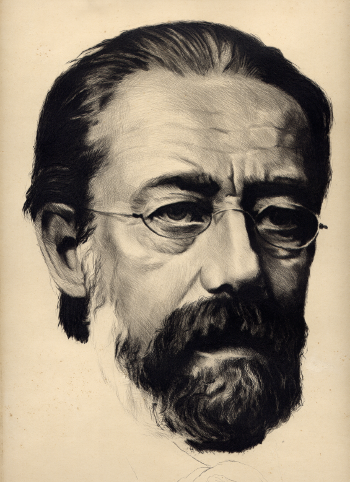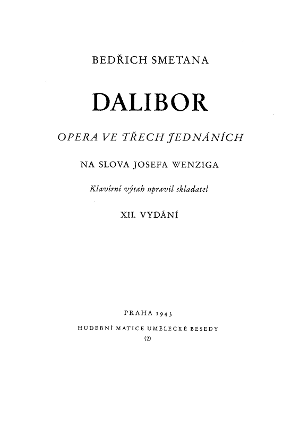
04 May 2015
Bedřich Smetana: Dalibor, Barbican Hall
Jiří Bělohlávek’s annual Czech opera series at the Barbican, London, with the BBC SO continued with Bedřich Smetana’s Dalibor.
English Touring Opera are delighted to announce a season of lyric monodramas to tour nationally from October to December. The season features music for solo singer and piano by Argento, Britten, Tippett and Shostakovich with a bold and inventive approach to making opera during social distancing.
This tenth of ten Live from London concerts was in fact a recorded live performance from California. It was no less enjoyable for that, and it was also uplifting to learn that this wasn’t in fact the ‘last’ LfL event that we will be able to enjoy, courtesy of VOCES8 and their fellow vocal ensembles (more below …).
Ever since Wigmore Hall announced their superb series of autumn concerts, all streamed live and available free of charge, I’d been looking forward to this song recital by Ian Bostridge and Imogen Cooper.
The Sixteen continues its exploration of Henry Purcell’s Welcome Songs for Charles II. As with Robert King’s pioneering Purcell series begun over thirty years ago for Hyperion, Harry Christophers is recording two Welcome Songs per disc.
Although Stile Antico’s programme article for their Live from London recital introduced their selection from the many treasures of the English Renaissance in the context of the theological debates and upheavals of the Tudor and Elizabethan years, their performance was more evocative of private chamber music than of public liturgy.
In February this year, Albanian soprano Ermonela Jaho made a highly lauded debut recital at Wigmore Hall - a concert which both celebrated Opera Rara’s 50th anniversary and honoured the career of the Italian soprano Rosina Storchio (1872-1945), the star of verismo who created the title roles in Leoncavallo’s La bohème and Zazà, Mascagni’s Lodoletta and Puccini’s Madama Butterfly.
Evidently, face masks don’t stifle appreciative “Bravo!”s. And, reducing audience numbers doesn’t lower the volume of such acclamations. For, the audience at Wigmore Hall gave soprano Elizabeth Llewellyn and pianist Simon Lepper a greatly deserved warm reception and hearty response following this lunchtime recital of late-Romantic song.
Collapsology. Or, perhaps we should use the French word ‘Collapsologie’ because this is a transdisciplinary idea pretty much advocated by a series of French theorists - and apparently, mostly French theorists. It in essence focuses on the imminent collapse of modern society and all its layers - a series of escalating crises on a global scale: environmental, economic, geopolitical, governmental; the list is extensive.
For this week’s Live from London vocal recital we moved from the home of VOCES8, St Anne and St Agnes in the City of London, to Kings Place, where The Sixteen - who have been associate artists at the venue for some time - presented a programme of music and words bound together by the theme of ‘reflection’.
'Such is your divine Disposation that both you excellently understand, and royally entertaine the Exercise of Musicke.’
Amongst an avalanche of new Mahler recordings appearing at the moment (Das Lied von der Erde seems to be the most favoured, with three) this 1991 Mahler Second from the 2nd Kassel MahlerFest is one of the more interesting releases.
‘And there was war in heaven: Michael and his angels fought against the dragon; and the dragon fought and his angels, And prevailed not; neither was their place found any more in heaven … that old serpent … Satan, which deceiveth the whole world: he was cast out into the earth, and his angels were cast out with him.’
If there is one myth, it seems believed by some people today, that probably needs shattering it is that post-war recordings or performances of Wagner operas were always of exceptional quality. This 1949 Hamburg Tristan und Isolde is one of those recordings - though quite who is to blame for its many problems takes quite some unearthing.
There was never any doubt that the fifth of the twelve Met Stars Live in Concert broadcasts was going to be a palpably intense and vivid event, as well as a musically stunning and theatrically enervating experience.
‘Love’ was the theme for this Live from London performance by Apollo5. Given the complexity and diversity of that human emotion, and Apollo5’s reputation for versatility and diverse repertoire, ranging from Renaissance choral music to jazz, from contemporary classical works to popular song, it was no surprise that their programme spanned 500 years and several musical styles.
The Academy of St Martin in the Fields have titled their autumn series of eight concerts - which are taking place at 5pm and 7.30pm on two Saturdays each month at their home venue in Trafalgar Square, and being filmed for streaming the following Thursday - ‘re:connect’.
The London Symphony Orchestra opened their Autumn 2020 season with a homage to Oliver Knussen, who died at the age of 66 in July 2018. The programme traced a national musical lineage through the twentieth century, from Britten to Knussen, on to Mark-Anthony Turnage, and entwining the LSO and Rattle too.
With the Live from London digital vocal festival entering the second half of the series, the festival’s host, VOCES8, returned to their home at St Annes and St Agnes in the City of London to present a sequence of ‘Choral Dances’ - vocal music inspired by dance, embracing diverse genres from the Renaissance madrigal to swing jazz.
Just a few unison string wriggles from the opening of Mozart’s overture to Le nozze di Figaro are enough to make any opera-lover perch on the edge of their seat, in excited anticipation of the drama in music to come, so there could be no other curtain-raiser for this Gala Concert at the Royal Opera House, the latest instalment from ‘their House’ to ‘our houses’.
"Before the ending of the day, creator of all things, we pray that, with your accustomed mercy, you may watch over us."

Jiří Bělohlávek’s annual Czech opera series at the Barbican, London, with the BBC SO continued with Bedřich Smetana’s Dalibor.
Bělohlávek has done more than anyone to bring authentic Czech music to Britain, and to the BBC Symphony Orchestra, where he was Chief Conductor for many years. They’ve got the idiom under their skin, now, and for Bělohlávek they played with expressive vigour.
Smetana has been called “The Father of Czech Music”, for he was the first to embrace characteristic Czech folk style, fused with the bright, sharp syntax of the Czech language. Dalibor is a particularly important milestone, since it’s explicitly nationalistic. though disguised as folklore. The Habsburgs ruled Bohemia from Vienna, and after 1848 clamped down on what they saw as sedition. Dalibor took part in an uprising, destroying a castle and killing the burgrave. Although Smetana downplays the politics (to escape the censors) the message of Dalibor is loud and clear: Czechs love music, and with music they shall triumph over repression.
Dalibor is a hero: “Dalibor! Dalibor” the chorus (the BBC Singers) rings out with fervour, picked up wordlessly by the orchestra throughout the opera. Jitka, a country girl (Alžběta Poláčková) tells us how he saved her as an orphan. Already though, we have a hint of his otherworldly purity. She sings as though she’s describing a saint. Wonderful “processional” music marks the entry of Vladislav, the Czech King (Ivan Kusnjer). Bělohlávek has been bringing the top singers from the Prague National Theatre, which he’s been conducting for years, so these singers are now greeted in London as if they were familiar friends. Besides, they can sing Czech repertoire better than anyone else. Kusnjer’s voice rang with dignity. Like Pontius Pilate, this King doesn’t want to kill, but Milada the Burgrave’s sister wants revenge.

Dana Burešova sang Milada. She’s another much-loved regular visitor. She sang the female lead in The Jacobin, The Bartered Bride and most of Bělohlávek’s other London performances of Czech opera. Milada is a forceful lady, and Burešova’s magnificent singing does her justice. The part calls for great vocal control, for the lines ring out with the intensity of a trumpet call, though Milada’s femininity is underlined by lustrous harp. Later Milada disguises herself as a harp-playing minstrel to charm her way into the prison.
Dalibor himself (Richard Samek) is more of an enigma. He killed the Burgrave because the Burgrave killed his friend Zdenek, who doesn’t appear in the opera, but lingers, ghost-like, in the strings. Zdenek was a violinist, and Dalibor’s love for him is so great that he’d rather be dead than live without him. Nonetheless, when he meets Milada, his love suddenly switches to her (on Zdenek’s musical messages). Dalibor’s a violinist, too. We don’t hear him play but we hear the violins in the orchestra surround him in a halo of sound. The smooth legato in his part suggests a bow gliding over strings. Beneš the jailer ( Jan Stava), also a violinist, lets him have his old instrument to pass the time, which Milada delivers. The violin is thus the means by which Dalibor could escape from the dungeon. If he wished, of course, because he doesn’t. When he’s caught by Budivoj (Svatopluc Sem, another regular) and told he’s to be executed, he’s meekly accepting. Perhaps he knows that his real secret weapon isn’t his life but his music.
“We Czechs love music” the text explicitly states, so the whole opera is a coded protest, though the Habsburg Empire ended only with the end of the First World War. Dalibor is wildly popular in Czech-speaking areas but the message is universal. When Gustav Mahler conducted Dalibor in Vienna in 1892, he may also have been making a private statement. Mahler was a boy from small town Bohemia, where his father had followed the same profession as Smetana’s father had done nearly 100 years before. Unlike Smetana, Mahler made it to the capital of the Habsburg empire, chosen and protected by the Emperor himself. Much is made of Mahler’s use of Ländler, reflecting the sounds he would have grown up with in a German-speaking area in the provinces. Mahler had been writing since his teens on themes connected to Des Knaben Wunderhorn, even writing his own poems. Almost certainly he would have been aware of Smetana. In Dalibor, for example, Jitka and Vitek (Aleš Voráček) sing a love duet which could come straight out of Wunderhorn, though it’s clearly Czech. Dalibor is clearly inspired by Beethoven Fidelio, although musically it’s very different. But might Mahler have thought of Dalibor when he wrote Das Lied des Verfolgten im Turm with its passionate refrain, “Die Gedanken sind frei!”?
This concert was recorded for broadcast on BBC Radio 3 from 16th May, and will be available online internationally.
Anne Ozorio